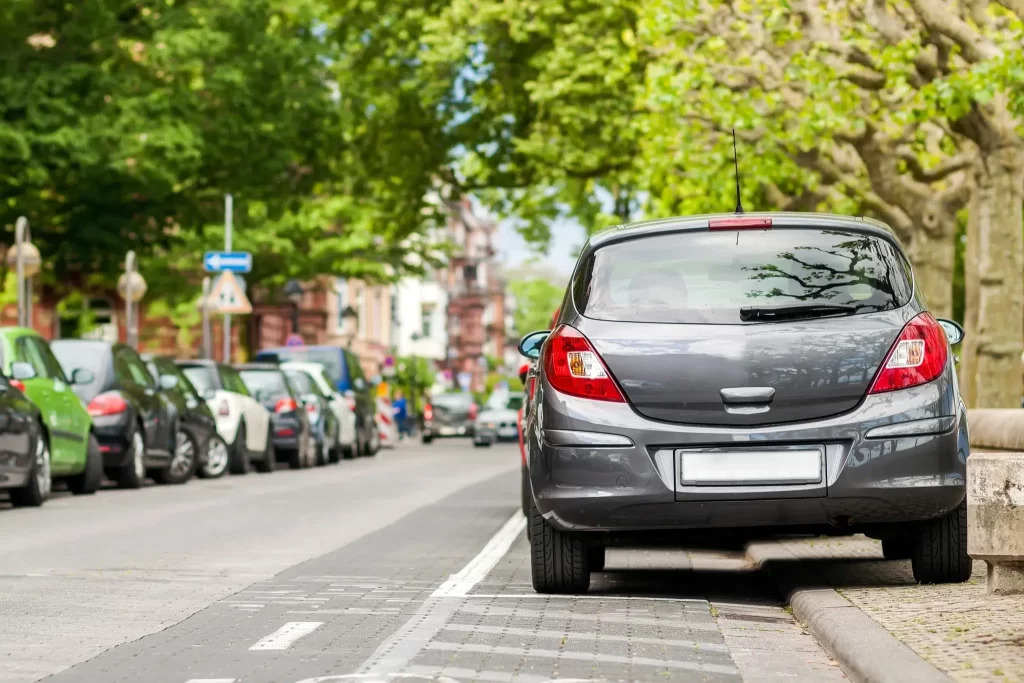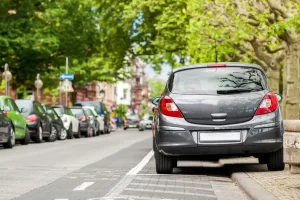Should pavement parking be banned?

Problem parking is a nuisance for many of us, whether it’s other drivers not sticking to the lines drawn or having to squeeze our cars into small gaps. Many would reluctantly admit to pulling up onto the kerb or risking it in a space, on the odd occasion if we’re in a rush or running late.
Many feel that persistent pavement parking isn’t fair on others, and has an impact, not just on our fellow road users, but pedestrians too who can’t access the pavement, which continues to shrink with bicycles and e-scooters also zooming along. Add a car to the mix and there’s nowhere else to go at times, other than the road, potentially in a wheelchair, with a walker, a pram, children or pets.
Now, as we approach ‘back-to-school’ season the prospect of problem parking is on the horizon. Parking without thinking about the impact on others actually leaves many in our communities vulnerable. And we’re all starting to take notice. Three in four people now say that pavement parking is rife where they live. So, should there be more done to curb it?
Before you read on, let us know your thoughts!
Is pavement parking illegal?
The short answer is no, pavement parking is not illegal across the UK. But there are some specific areas where it is, and you can still be fined for it, wherever you are. To call it a grey area is a bit of an understatement.
Rule 244 of the Highway Code states: “You MUST NOT park partially or wholly on the pavement and should not do so elsewhere unless signs permit it.”
Interestingly, pavement parking has been banned in London since 1974. But elsewhere it’s less clear cut. Councils do not have the authority to fine drivers for pavement parking, and although the police can do so, it’s rarely enforced.
In Northern Ireland, pavement parking is prohibited in certain places, such as cycle lanes or bus stops, and in England and Wales, the issue has last came up in Parliament in October 2023. But no changes have been made as of yet.
In 2015, a Private Members’ Bill was introduced in Parliament, which sought to make parking on the pavement illegal across the UK. However, it didn’t make it past a second reading in the House of Commons after doubts were raised over where residents of narrow streets could park if there are no off-street spaces available.
It is fair to say that it can be particularly challenging for those who own a vehicle in built up areas, with narrow roads and no other alternative.
Will pavement parking become illegal?
It’s a possibility that pavement parking could become illegal. One city recently joined London in banning pavement parking completely. Councils in Scotland will soon have the power to enforce it, with Edinburgh becoming just the second city in the UK to ban pavement parking.
Campaign photos used by Edinburgh City Council

The new rule was launched at the end of January following a public awareness campaign, and drivers who continually park on Edinburgh’s pavement could now face a £100 fine. More than 600 FPNs were issued during the first four weeks of the ban – and on average 15 pavement parkers each day are being fined.
The argument against pavement parking
When you park your vehicle partially or fully on the pavement, you take up the space designated for pedestrians to safely continue their journey. For some of us, it’s easy shrug off the annoyance and walk into the road to pass, even though we are at risk of oncoming traffic.
But for others, the danger is even greater. For parents with prams parked cars can make the pavement untraversable, so they must push their young child into the path of cars, buses, and lorries on the road. It’s frustrating and frightening.
It’s also dangerous for those who use wheelchairs, have sight impairments or other disabilities. Coming off the pavement is not as simple as nipping past a narrow gap and venturing into the road is potentially more dangerous.
The argument for pavement parking
Of course, not everyone will be in favour of banning pavement parking. Some of us live on narrower roads, where parking on the pavement is a way of ensuring the road is still driveable. There’s also the argument that it makes it easier for emergency service vehicles to pass through.
To avoid parking on the pavement, the other option is to park elsewhere. Yes, it’s a small inconvenience to walk further, but this is the simplest solution to clearing pavements so that pedestrians can safely use them.
However, not being able to park outside your home can leave people worried about their vehicle. After all, keeping an eye on your vehicle grants peace of mind. There are ways of having a safe and secure parking spot, but these can come at a cost that not everyone can afford. Where you park, i.e. on the street, on a driveway, or elsewhere, can also affect the cost of your insurance policy.
Save on your insurance, not the service
If you have any concerns about your parking and how it might affect your insurance, or any other queries about your policy, our friendly, local teams are here to help. We’re big believers in doing things properly – that is, expert advice from a real human being, not a chatbot or AI.
So, if that sounds like the kind of service you’d like from your insurance provider, simply search Howden Insurance, give your local team a call or pop into your local branch for a chat.

Sources: BBC News, Edinburgh Evening News, RAC





